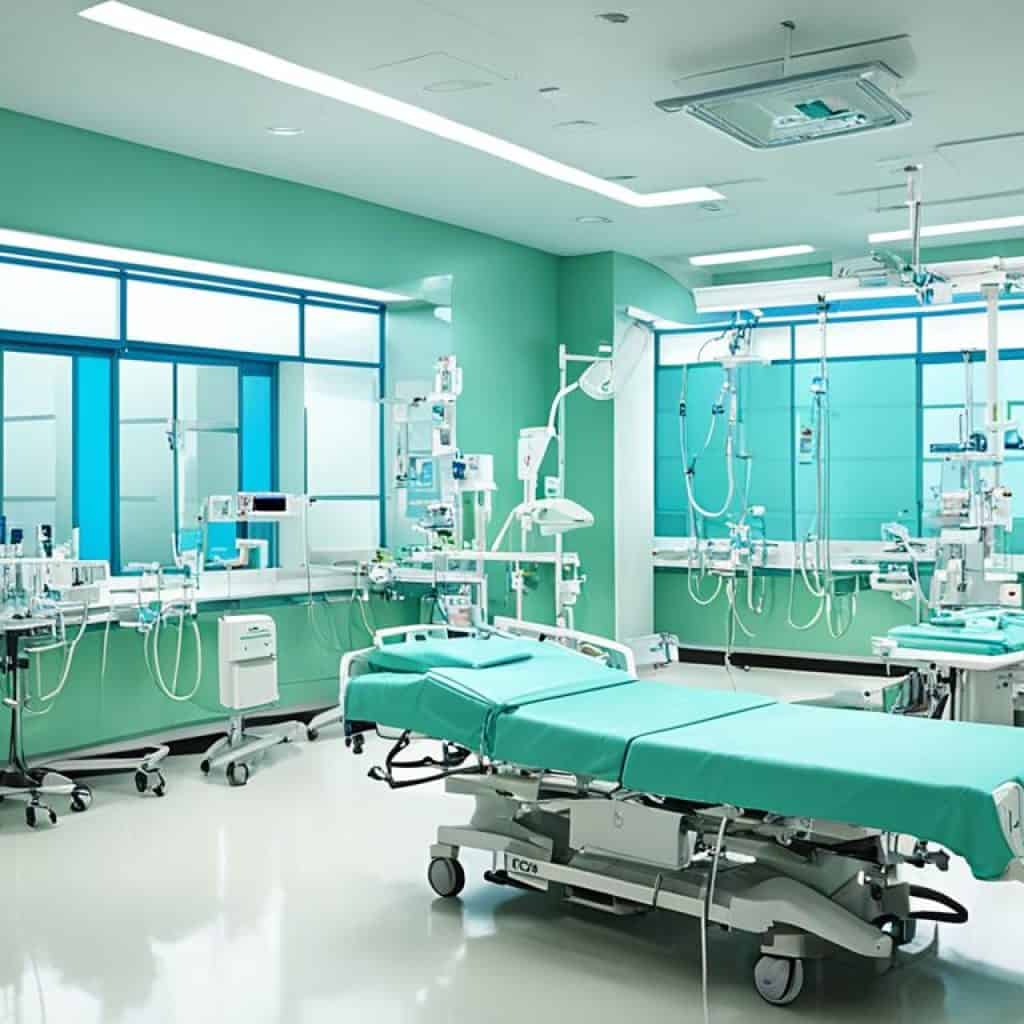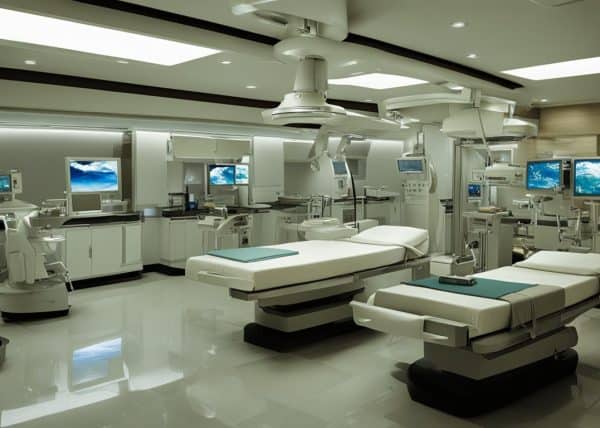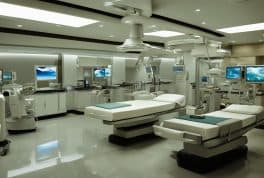Medical Tourism in the Philippines: A Comprehensive Insight
Have you ever dreamt of combining your healthcare needs with a tropical vacation? Well, the Philippines offers just that – an enticing blend of top-tier healthcare services and breathtaking travel destinations. As someone who values both their well-being and adventure, I was thrilled to discover the rising trend of medical tourism in this beautiful country.
Let me share my personal experience with you. When I found out about the Philippines' reputation for high-quality healthcare and its stunning landscapes, I couldn't help but be drawn in. The idea of receiving expert medical treatment while also exploring the vibrant culture and natural wonders of this Southeast Asian gem was simply irresistible.
From the moment I arrived, I was greeted with warmth and hospitality. The Filipino people are known for their welcoming nature, and this extends to the medical professionals who go above and beyond to ensure the best possible patient experience. I felt truly cared for, as they not only provided exceptional medical care but also made sure I felt comfortable and supported throughout my journey.
What impressed me the most was the seamless integration of Western medicine with traditional Filipino healing practices. The country's medical experts combine their extensive knowledge of modern healthcare with centuries-old traditions, offering a holistic approach to treatment that addresses both the physical and cultural aspects of well-being.
Key Takeaways:
- The Philippines is an emerging destination for medical tourism, combining quality healthcare with stunning travel opportunities.
- The country's healthcare system blends Western medicine with traditional Filipino healing practices, providing a comprehensive and culturally sensitive approach.
- Filipino medical professionals prioritize the patient experience, offering personalized packages that include airport pick-up, in-hospital translators, and vacation-style recovery options.
- The Philippines excels in various medical procedures, including cosmetic surgery, dental procedures, ophthalmology, cardiology, and orthopedics.
- Renowned hospitals and clinics in Manila and Cebu have received international accreditations, ensuring world-class healthcare standards.
Historical and Cultural Significance in Medicine
While the Philippines may not have a long-standing history in medical expertise, it has a strong foundation in Western medicine due to its historical ties with the United States. The country has incorporated traditional Filipino healing practices into its healthcare system, creating a unique blend of modern and traditional medicine. This approach offers a comprehensive and culturally sensitive approach to healthcare.
Reputation for Quality
When it comes to medical expertise in the Philippines, the country has been gaining recognition worldwide, solidifying its reputation for providing quality healthcare. With a strong focus on international accreditations, medical institutions in the Philippines are at the forefront of delivering top-notch medical services.
One of the factors contributing to the country's reputation is the extensive training that Filipino doctors and nurses undergo. Many healthcare professionals have received education and training in renowned institutions in the United States and other developed countries. This exposure equips them with the latest medical technologies and methodologies, ensuring that patients receive the highest standard of care.
The combination of international training and expertise positions the Philippines as a reliable destination for medical tourism. Patients can have confidence in the medical professionals' ability to provide advanced and effective treatment options.
“The Philippines' commitment to international accreditations showcases the dedication of its medical institutions, ensuring that patients receive high-quality care in line with global healthcare standards."
In recognition of their commitment to quality, many hospitals and clinics in the Philippines have received international accreditations, such as the Joint Commission International (JCI) accreditation. This further validates the country's commitment to meeting global healthcare benchmarks and providing safe and effective medical services.
Take a look at the table below for an overview of some renowned medical institutions and their international accreditations:
| Medical Institution | Accreditations |
|---|---|
| St. Luke's Medical Center | Joint Commission International (JCI) |
| Makati Medical Center | Joint Commission International (JCI) |
| Cebu Doctors' University Hospital | Philippine Council for Accreditation of Healthcare Organizations (PCAHO) |
These accreditations signify a commitment to providing quality care and adherence to international standards, giving patients peace of mind when choosing medical treatment in the Philippines.
Focus on the Medical Tourist
What sets the Philippines apart as a medical tourism destination is its unwavering focus on delivering an exceptional patient experience. Unlike other countries, medical institutions in the Philippines go above and beyond to cater to the unique needs of medical tourists, ensuring their comfort and well-being from the moment they arrive.
One of the key elements that contribute to the patient experience is the provision of tailor-made packages specifically designed for medical tourists. These comprehensive packages include a range of services to make the entire journey seamless and stress-free.
Personalized Services
Upon arrival, medical tourists are greeted with warm hospitality and provided with airport pick-up services to ensure a smooth transition to their chosen medical institution. This personalized care extends to their stay in the hospital, where in-hospital translators are readily available to facilitate effective communication between the medical staff and patients.
Furthermore, medical tourists are provided with vacation-style recovery options, allowing them to recuperate in serene and tropical surroundings. This unique approach ensures that patients not only receive top-notch medical care but also enjoy a relaxing and enjoyable recovery period.
"The Philippines offers an exceptional patient experience, combining world-class healthcare services with warm Filipino hospitality."
These tailor-made packages for medical tourists in the Philippines are meticulously designed to create a hassle-free experience, providing peace of mind and allowing patients to solely focus on their health and well-being.
With a deep understanding of the importance of patient experience, the Philippines stands out as an ideal destination for individuals seeking quality medical treatment in a serene and welcoming environment.
Popular Medical Procedures
The Philippines is renowned for its expertise in a wide range of medical procedures, making it a sought-after destination for individuals seeking cosmetic surgery, dental procedures, ophthalmology treatments, cardiology interventions, and orthopedic surgeries. With a focus on advanced technology and specialized expertise, the country offers exceptional healthcare options for international patients.
Some popular medical procedures in the Philippines include:
- Rhinoplasty
- Breast augmentation
- Dental implants
- Lasik eye surgery
In addition, the country is at the forefront of innovative treatments such as stem cell therapy and robotic surgery. The Philippines' commitment to medical advancements ensures that patients have access to cutting-edge procedures and the highest standards of care.
One of the primary reasons individuals choose to undergo medical procedures in the Philippines is the availability of skilled healthcare professionals who have honed their expertise both within and outside the country. This expertise, coupled with the warm and compassionate care provided by medical teams, creates an environment conducive to positive outcomes and patient satisfaction.
"The Philippines is a hub for various medical procedures, offering a wide spectrum of treatments to improve both physical appearance and overall health. Our experienced doctors and state-of-the-art facilities ensure that patients receive exceptional care and achieve the desired results."
- Dr. Maria Cruz, Cosmetic Surgeon

To further enhance the patient experience, medical facilities in the Philippines maintain high levels of professionalism, prioritizing safety and comprehensive care. Patients can expect personalized treatment plans, thorough pre-operative evaluations, and diligent post-operative care.
Whether individuals are seeking cosmetic enhancements, dental transformations, or vision correction, the Philippines offers a diverse range of medical procedures delivered with expertise, precision, and a commitment to patient well-being.
Top Hospitals & Clinics
Manila and Cebu are home to renowned medical institutions in the Philippines, including St. Luke's Medical Center, Makati Medical Center, and Cebu Doctors' University Hospital.
These hospitals have received international accreditations and have been recognized for their innovation in healthcare and patient care services.
St. Luke's Medical Center
St. Luke's Medical Center is a premier healthcare institution in the Philippines, offering world-class medical services across various specialties. With a commitment to excellence, St. Luke's is equipped with advanced medical technology and a team of highly skilled physicians and healthcare professionals. The hospital's dedication to patient-centric care and continuous innovation has earned it a reputation as one of the top hospitals in the country.
Makati Medical Center
Makati Medical Center is renowned for its comprehensive range of medical services and outstanding patient care. It houses state-of-the-art facilities, advanced medical equipment, and a team of internationally trained medical specialists. Makati Medical Center's commitment to providing personalized care and cutting-edge medical treatments has made it a preferred choice for both local and international patients.
Cebu Doctors' University Hospital
Cebu Doctors' University Hospital is a leading healthcare institution in Cebu City, offering high-quality medical services across various specialties. Recognized for its patient-focused approach and commitment to compassionate care, the hospital combines advanced medical technology with a team of expert healthcare professionals. Cebu Doctors' University Hospital is dedicated to delivering excellent healthcare services and ensuring the well-being of its patients.
Cost Comparison
When considering medical tourism, one of the major factors that attract patients is the significant cost savings they can achieve. Medical procedures in the Philippines are remarkably more affordable compared to Western countries, allowing patients to save anywhere from 40% to 80%. This cost advantage makes the Philippines an appealing choice for those seeking quality healthcare at a fraction of the price.
Let's take a closer look at the cost comparison between the United States and the Philippines for a heart bypass procedure:
| Country | Cost of Heart Bypass Procedure |
|---|---|
| United States | $100,000 |
| Philippines | $17,000 - $19,000 |
As seen in the table above, a heart bypass procedure that typically costs $100,000 in the United States can be as low as $17,000 to $19,000 in the Philippines. This significant cost difference allows patients to access world-class medical care while enjoying substantial savings.
It is important to note that the actual costs may vary depending on the specific procedure and the medical institution chosen. However, prospective patients can expect a considerable reduction in expenses by opting for medical treatment in the Philippines.
By choosing medical tourism in the Philippines, patients can benefit from top-notch healthcare services at a more affordable price point. These cost savings open up opportunities for individuals who may not have access to expensive medical procedures in their home countries.
Next, let's delve into the quality and safety standards upheld in the Philippine healthcare system to provide a comprehensive understanding of the benefits and safeguards associated with medical tourism.
Quality & Safety
The Philippines prioritizes medical standards and patient safety, ensuring adherence to international healthcare protocols and procedures. With a commitment to maintaining quality healthcare services, hospitals and clinics undergo rigorous accreditation processes to meet global benchmarks.
"Our dedication to providing exceptional healthcare is demonstrated through our strict adherence to internationally recognized medical standards and protocols. We continuously strive to deliver high-quality care and prioritize patient safety."
Patient safety protocols are implemented at every level of healthcare delivery. From obtaining informed consent to maintaining confidentiality and managing emergency situations, medical institutions in the Philippines prioritize securing the well-being and rights of patients.
Accreditation Systems in the Philippines
The Philippines has established robust accreditation systems to ensure the quality and safety of healthcare services. These systems evaluate facilities' adherence to stringent standards and guidelines.
| Accreditation Body | Accredited Facilities |
|---|---|
| Philippine Health Insurance Corporation (PhilHealth) | Public and private hospitals and clinics |
| Department of Health (DOH) | Public hospitals and health facilities |
| Joint Commission International (JCI) | Leading private hospitals |
These accreditation bodies ensure that medical institutions in the Philippines maintain the highest standards of quality and patient care. By meeting the criteria set by these organizations, hospitals and clinics demonstrate their commitment to delivering world-class healthcare services.
With a focus on continuous improvement, medical institutions in the Philippines undergo regular assessment and monitoring to uphold their accreditation status. This commitment to quality and safety sets the Philippines apart as a reliable destination for medical tourism.

Medical Visa Information
Patients seeking long-term medical treatment in the Philippines are required to obtain a medical visa. The application process for a medical visa involves submitting specific documents and meeting certain requirements.
To apply for a medical visa, you will need:
- A valid passport with a minimum of six months validity
- Evidence of financial capability to cover the medical expenses
- Medical documents supporting the need for treatment
Once the medical visa is granted, the initial stay allowed is typically two months. However, this duration can be extended as per the patient's treatment needs, upon approval from the Bureau of Immigration. It is important to note that the extension process may require additional documentation to support the continued medical treatment.
It is advisable to consult with the medical institution or a professional immigration consultant for accurate information and guidance on the medical visa requirements and application process.
Cultural Considerations
When it comes to receiving medical care in the Philippines, patients can expect a warm and accommodating environment. The Filipino people are known for their hospitality and friendly nature, making visitors feel comfortable and welcomed. This cultural aspect adds an extra layer of support and care during their medical journey.
Language in Medical Institutions
One of the advantages of seeking medical treatment in the Philippines is the widespread use of the English language in healthcare settings. Medical professionals in the country are usually fluent or proficient in English, ensuring effective communication and understanding between doctors and patients. This language accessibility eliminates any language barriers and allows patients to express their concerns and needs with ease.
Dietary Considerations in Hospitals
Medical institutions in the Philippines prioritize dietary considerations to cater to different patient needs. Hospitals offer a variety of food options, accommodating various dietary requirements, including vegetarian, vegan, gluten-free, and halal. This ensures that patients can adhere to their specific dietary restrictions while receiving the necessary medical care.

"The warm and compassionate nature of the Filipino people creates a comforting environment for patients seeking medical treatment in the Philippines. With English widely spoken in medical institutions and hospitals catering to diverse dietary needs, patients can focus on their recovery while feeling supported and understood."
Travel & Accommodation
Metro Manila and Cebu City offer a wide range of accommodation options in close proximity to medical facilities. Whether you're looking for budget-friendly hotels or luxurious resorts, you'll find the perfect place to stay during your medical journey in the Philippines. Most recommended accommodations are conveniently located just a short drive away from major medical institutions, ensuring easy access to the healthcare services you need. Some accommodations even provide shuttle services to and from the hospitals, making your travel arrangements hassle-free.
When it comes to getting around the city, there are several transportation options available. Public transportation, such as taxis and ride-share services, are readily accessible and can take you to your medical appointments and other destinations. Additionally, many hospitals offer hospital-arranged transportation, providing you with a convenient and reliable way to travel between your accommodation and medical facilities.
Here's a glimpse of some recommended accommodations in Metro Manila and Cebu City:
| Accommodation | Location | Proximity to Medical Facilities | Shuttle Service |
|---|---|---|---|
| Hotel A | Metro Manila | 5 minutes | Yes |
| Resort B | Cebu City | 10 minutes | Yes |
| Hotel C | Metro Manila | 15 minutes | No |
| Resort D | Cebu City | 20 minutes | Yes |
Explore the options available based on your preferences and budget to find the perfect accommodation that suits your needs. The Philippines offers a delightful combination of world-class medical facilities and comfortable accommodations, ensuring a seamless and stress-free experience during your medical journey.
Legal & Ethical Considerations
When it comes to seeking medical treatment in the Philippines, patients have certain legal rights that protect their interests and well-being. These rights include the right to informed consent and the right to file complaints if their rights are violated during the course of their medical care, ensuring accountability and patient empowerment.
The country also has well-established medical malpractice laws in place to provide affected patients with legal recourse in case of any negligence or misconduct by healthcare professionals. This serves as a safeguard for patients, ensuring that they receive the appropriate standard of care and that any wrongdoing is addressed according to legal procedures.
Ethics in healthcare is of utmost importance, and the Philippines adheres to strict ethical guidelines to safeguard the rights and welfare of patients. This is particularly evident in sensitive medical procedures like organ transplantation, where ethical considerations play a crucial role in preserving fairness, transparency, and respect for the dignity of the individuals involved.
Conclusion
Medical tourism in the Philippines offers a range of benefits that make it an attractive option for individuals seeking quality healthcare and a unique travel experience. One of the key advantages is the cost-effectiveness of medical procedures, with savings of up to 80% compared to Western countries. This affordability, coupled with high-quality healthcare services, makes the Philippines a compelling choice for medical tourists.
Moreover, the Philippines prioritizes the patient experience by providing tailor-made packages that include personalized services such as airport pick-up, in-hospital translators, and vacation-style recovery options. This attention to detail, combined with the warm hospitality of the Filipino people, ensures that patients feel comfortable and well-cared for during their medical journey.
However, like any endeavor, there are risks that should be considered. Language barriers can pose a challenge for some patients, but the majority of medical institutions in the Philippines have English-speaking staff who can provide assistance. Additionally, differences in legal systems and standards of care should be taken into account, and prospective medical tourists are advised to thoroughly research and understand these aspects before making a decision.
Despite these potential risks, the Philippines offers a comprehensive post-procedure care system, including follow-up consultations and rehabilitation services in top-quality centers. This ensures that patients receive ongoing support and care after their medical treatment, further enhancing the positive outcomes of their medical tourism experience. In conclusion, with its blend of cost-effectiveness, high-quality healthcare, and focus on patient satisfaction, the Philippines is an appealing destination for individuals seeking medical treatment combined with a memorable travel experience.
FAQ
What is medical tourism?
Medical tourism refers to the practice of traveling to another country to receive medical treatment or healthcare services. It combines medical procedures and travel, allowing individuals to receive high-quality medical care while also enjoying a new destination.
Why is the Philippines considered a top medical tourism destination?
The Philippines is recognized as a top medical tourism destination due to its blend of high-quality healthcare services, skilled medical professionals, and affordable prices. The country offers advanced medical facilities, a holistic approach to healthcare, and a focus on patient experience, making it an attractive choice for medical tourists.
What types of medical procedures are popular in the Philippines?
The Philippines is well-regarded for various medical procedures, including cosmetic surgery, dental procedures, ophthalmology, cardiology, and orthopedics. Popular procedures in the country include rhinoplasty, breast augmentation, dental implants, and Lasik eye surgery.
Which are the top hospitals and clinics in the Philippines?
The Philippines is home to renowned medical institutions such as St. Luke's Medical Center, Makati Medical Center, and Cebu Doctors' University Hospital. These hospitals have received international accreditations and are known for their innovation in healthcare and patient care services.
How much can I save on medical procedures in the Philippines compared to Western countries?
Medical procedures in the Philippines can be significantly more affordable compared to Western countries, with savings ranging from 40% to 80%. The exact cost savings depend on the procedure and medical institution, but choosing the Philippines for medical treatment can lead to substantial savings.
Are there standards in place for medical practice and patient safety in the Philippines?
Yes, the Philippines adheres to international standards of medical practice and has stringent accreditation processes for hospitals and clinics. These processes ensure that healthcare providers in the country meet global quality and safety benchmarks. Patient safety and rights, including informed consent, confidentiality, and emergency protocols, are taken seriously in the Philippines.
Do I need a medical visa to receive treatment in the Philippines?
Yes, if you are seeking long-term treatment in the Philippines, you will typically require a medical visa. The requirements for a medical visa include a valid passport, financial capability to pay for medical services, and medical documents supporting the need for treatment. The initial stay allowed on a medical visa is usually two months, extendable as needed.
Is English widely spoken in medical institutions in the Philippines?
Yes, English is widely spoken in medical institutions in the Philippines. Many healthcare professionals are fluent or proficient in English, ensuring effective communication with international patients. This language proficiency helps alleviate language barriers for medical tourists.
What are the accommodation options near medical facilities in the Philippines?
Metro Manila and Cebu City offer various accommodation options near medical facilities, ranging from budget hotels to luxury resorts. Most recommended accommodations are within a short drive from major medical institutions, and some even provide shuttle services to and from the hospitals. Public transportation options like taxis and ride-share services are readily available, but hospital-arranged transportation is a convenient option.
What legal rights do patients have in the Philippines?
Patients in the Philippines have legal rights, including informed consent and the right to lodge complaints if their rights are violated. The country has medical malpractice laws, ensuring affected patients have legal recourse. Ethical guidelines are strictly adhered to, especially regarding sensitive procedures like organ transplantation.
What are the benefits and risks of medical tourism in the Philippines?
The Philippines offers numerous benefits as a medical tourism destination, including cost-effectiveness, high-quality healthcare, and a focus on the patient experience. However, potential risks include language barriers and differences in legal systems. Post-procedure care is readily available, including follow-up consultations and rehabilitation services in top-quality centers.
Source Links
- https://www.magazine.medicaltourism.com/article/philippines-medical-tourism-destination
- https://www.medicaltourism.com/destinations/philippines
- https://www.linkedin.com/pulse/philippines-strategy-medical-tourism-tapping-middle-east-business
Section 1: Introduction to Medical Tourism in the Philippines
The Philippines, an archipelago nation in Southeast Asia, has recently emerged as a pivotal player in the global medical tourism industry. Medical tourism, the practice of traveling to another country for medical treatment, has gained significant momentum in the past few decades, and the Philippines stands out as a preferred destination. This phenomenon can be attributed to a confluence of factors such as affordable healthcare services, high-quality medical facilities, proficient English-speaking medical staff, and the nation's natural scenic beauty which aids in recuperation.
Section 2: Historical Perspective and Growth
Medical tourism in the Philippines is not a novel concept; it has roots tracing back to the early 2000s when the government first recognized the potential of the healthcare sector in boosting the nation's economy. Since then, the Philippines has been strategically enhancing its medical infrastructure and services to cater to international patients. The growth trajectory of medical tourism in the Philippines has been impressive, with a steady increase in the number of medical tourists, particularly from countries like the United States, Canada, Europe, and neighboring Asian countries.
Section 3: Healthcare System and Standards
A key factor contributing to the Philippines' prominence in medical tourism is its robust healthcare system. The country boasts an array of JCI (Joint Commission International) accredited hospitals, which is considered the gold standard in global healthcare. Filipino doctors and medical staff are highly trained, often with international exposure, ensuring that they are abreast with the latest medical practices and technologies. These high standards of care, combined with comparatively lower medical costs, make the Philippines an attractive option for medical tourists.
Section 4: Range of Medical Services Offered
The Philippines offers a wide spectrum of medical services, ranging from elective procedures like cosmetic surgery, dental care, and LASIK eye surgery to more complex operations such as cardiac surgery, orthopedic procedures, and cancer treatment. The expertise of Filipino medical professionals, coupled with state-of-the-art technology, ensures that these services are on par with global standards.
Section 5: Cost-Effectiveness of Medical Treatment
One of the most compelling reasons for the surge in medical tourism in the Philippines is the cost-effectiveness of medical treatment. Patients can expect to save a significant amount on medical procedures compared to the cost in their home countries. This affordability does not compromise the quality of healthcare but is rather a result of the lower cost of living and operational expenses in the Philippines.
Section 6: The Role of the Government and Private Sector
The Philippine government, in partnership with the private sector, plays a crucial role in promoting and sustaining medical tourism. Initiatives such as the Philippine Medical Tourism Program have been implemented to streamline and enhance the experience of medical tourists. The government has also been active in facilitating partnerships between local and international healthcare providers to elevate standards and attract a broader clientele.
Section 7: The Experience Beyond Medical Treatment
Medical tourism in the Philippines is not just about healthcare; it's an experience that amalgamates treatment with leisure and cultural immersion. The country's rich cultural heritage, warm hospitality, and scenic landscapes offer a holistic healing environment. Many medical tourists combine their medical trips with vacationing in popular destinations like Boracay, Palawan, and Cebu, which adds to the allure of choosing the Philippines for medical care.
Section 8: Challenges and the Way Forward
Despite its many advantages, medical tourism in the Philippines faces challenges such as competition from other Asian countries, logistical issues for international patients, and the need for continuous improvement in healthcare standards. Addressing these challenges is crucial for the sustainable growth of medical tourism in the Philippines. Efforts are being made to enhance infrastructure, streamline visa procedures for medical tourists, and strengthen international collaborations.
Section 9: Testimonials and Success Stories
The success of medical tourism in the Philippines is best reflected in the stories of those who have experienced it firsthand. Numerous testimonials from satisfied patients highlight the quality of care, the professionalism of medical staff, and the overall positive experience of their medical journey in the Philippines. These personal accounts serve as powerful endorsements, further solidifying the country's reputation in the global medical tourism arena.
Section 10: Conclusion
In conclusion, medical tourism in the Philippines presents a compelling proposition for those seeking high-quality, affordable medical care in a serene and welcoming environment. The combination of world-class healthcare facilities, cost-effectiveness, and the natural beauty of the Philippines creates a unique and attractive package for medical tourists worldwide. As the industry continues to evolve, the Philippines is well-positioned to become an even more prominent destination in the world of medical tourism.




















